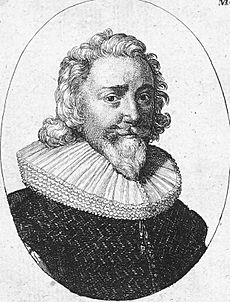Benjamin Rudyerd facts for kids

Sir Benjamin Rudyerd (born 1572 – died 1658) was an English poet and politician. He was a member of the House of Commons, which is like a part of today's Parliament, at different times between 1621 and 1648. He also invested in colonies, helping to start the Providence Company in 1630. During the English Civil War, he supported the Parliamentary side, but he was a moderate, meaning he preferred peaceful solutions.
Contents
Early Life and Education
Benjamin Rudyerd was born in 1572. His father was James Rudyerd from Hartley Wintney, a place in Hampshire, England.
He went to school at Winchester College and then studied at St John's College, Oxford, which are both famous schools. After his studies, he became a lawyer.
A Talented Poet
When he was young, Benjamin Rudyerd was known for his poetry. Even though his poems weren't printed until after he died, many people admired his writing. He was also respected for his opinions on other people's writing.
He became a close friend of the famous poet and playwright Ben Jonson. Ben Jonson even wrote three poems about Rudyerd in 1616. One of them started with these lines:
Rudyerd, as lesser dames to great ones use,
My lighter comes to kiss thy learned muse
Rudyerd was also friends with other writers like John Owen and John Hoskins. Interestingly, John Hoskins once hurt Rudyerd in a duel, but they later became very good friends!
Even more helpful for Rudyerd was the support of the Earl of Pembroke. The Earl was a very important supporter of the arts in England. He helped Rudyerd with his political career. Some of Rudyerd's most important poems that we still have today were written as replies to poems by the Earl.
Becoming a Politician
In 1618, Benjamin Rudyerd was made a knight, which meant he was given the title "Sir." He also got an important job for life as the Surveyor of the Court of Wards. This was a job that paid well. When this job was ended in 1647, Parliament gave him £6,000 as a thank you for his service.
He spent a long time as a member of Parliament. Many of the places he represented were areas where the Earl of Pembroke had a lot of influence.
Early Parliamentary Years
In 1621, Rudyerd was chosen to be a Member of Parliament (MP) for Portsmouth. He was re-elected for Portsmouth in 1624 and 1625.
At first, Rudyerd generally supported the King's government, following the lead of his friend the Earl of Pembroke. By 1624, he was seen as the government's unofficial spokesperson in the House of Commons. He continued to support Buckingham, a powerful figure, even after Charles I became King.
In 1626, Rudyerd was elected MP for Old Sarum. He was one of the MPs chosen to help with the impeachment (a type of trial) of Buckingham, but he didn't take a public part in it.
A Mediator in Parliament
In 1628, he was elected MP for Downton. He served until 1629, when King Charles I decided to rule without Parliament for eleven years.
By the end of the 1620s, Rudyerd was less supportive of the King. He strongly criticized how the King handled people's complaints and argued that the King couldn't arrest people without a good reason. However, he often tried to be a peacemaker between the King and Parliament. In one speech, he said, "This is the crisis of Parliaments: we shall know by this if parliaments live or die. If we persevere, the King to draw one way, the parliament another, the Commonwealth must sink in the midst." He meant that if the King and Parliament kept fighting, the country would suffer.
Colonial Interests and Later Parliament
During the time when there was no Parliament (1629-1640), Rudyerd became interested in new settlements in North America. In 1630, he helped start the Providence Company, which was involved in these colonial developments. In 1634, he bought a large estate called the manor of West Woodhay in Berkshire.
When Parliament was called again in April 1640 (known as the Short Parliament), Rudyerd was elected MP for Wilton. He again tried to be a mediator, saying on the first day of debate that he wanted them to act with "moderation" so that Parliament could lead to "many more happy parliaments."
In November 1640, he was re-elected MP for Wilton in the Long Parliament. His first speech in this new Parliament was less friendly towards the King. He strongly attacked the King's "evil counsellors."
English Civil War and Retirement
When the English Civil War began, Rudyerd sided with Parliament. However, he wasn't always an eager supporter of the war, and he sometimes had to be told to attend meetings.
In 1643, he was chosen to be part of the Westminster Assembly, a group of religious leaders and MPs who advised Parliament on church matters. In the same year, he also joined a council set up by Parliament to govern the English colonies.
Rudyerd was against putting the King on trial. Because of this, he was removed from Parliament during an event called Pride's Purge. After this, he stopped being involved in public life.
He had a very long career in Parliament. People at the time nicknamed him the silver trumpet of Parliaments because he was a very good speaker.
Benjamin Rudyerd died in 1658 at his home, West Woodhay House, in Berkshire. He was about 86 years old.
He was married to Elizabeth Harington, who was the daughter of Sir Henry Harington and a relative of the Earl of Pembroke.

